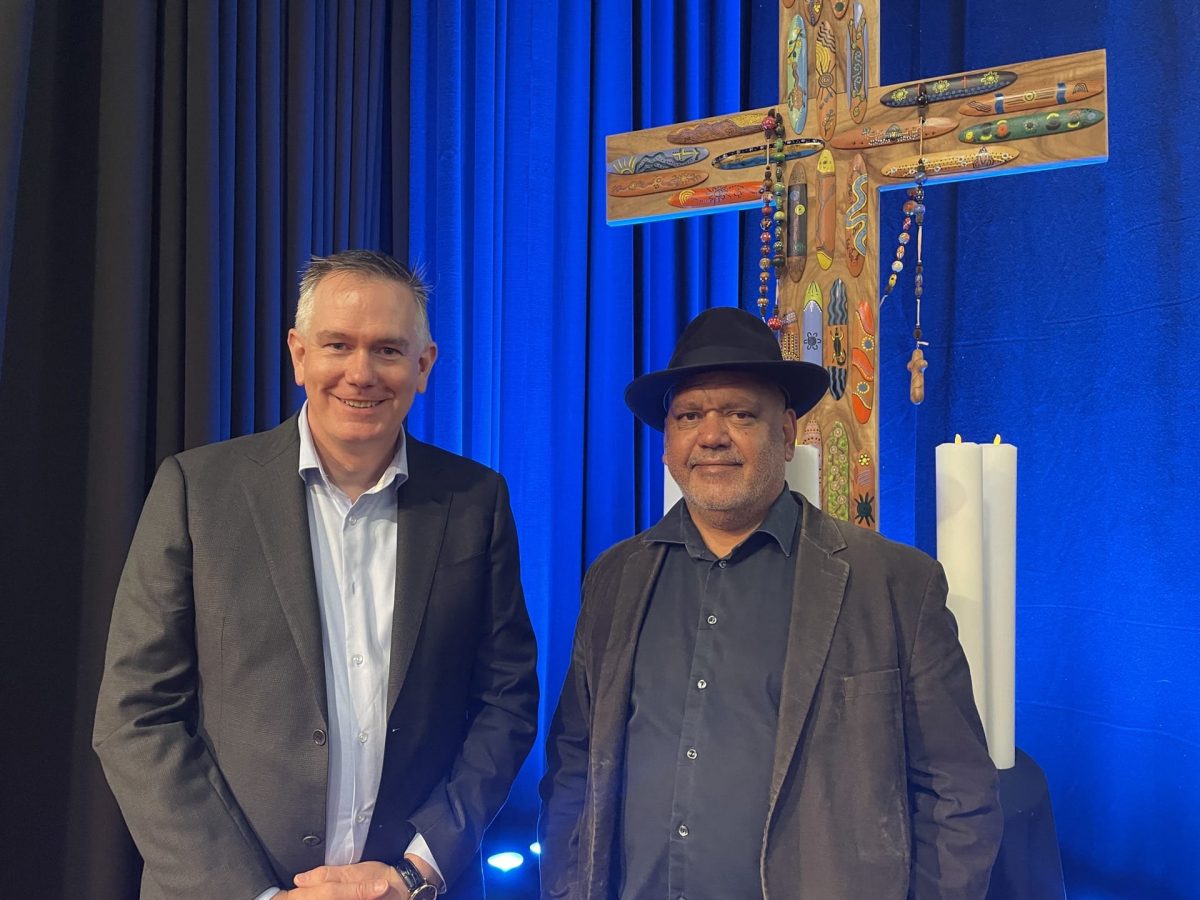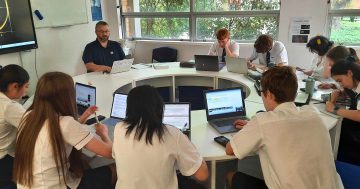
Catholic Education Canberra Goulburn director Ross Fox and Noel Pearson, director of the Cape York Institute and Good to Great Schools Australia. Photo: Genevieve Jacobs.
Leading Aboriginal thinker and education advocate Noel Pearson has described a major re-orientation in teaching and learning practices at Catholic schools in the ACT and South Eastern NSW as “a beacon” with far-reaching impacts for vulnerable and disadvantaged students across Australia.
Catalyst is a system-wide program operating across 56 Catholic schools in the Canberra Goulburn Archdiocese, spanning Eden on the Far South Coast to Lake Cargelligo in Western NSW, including the ACT, and covering a wide range of socio-economic conditions.
Catalyst focuses on direct instruction – a teacher-led system of active and highly engaged learning. Students are assessed on whether they have mastered critical concepts before progressing.
The program contrasts with ”inquiry learning” – a popular teaching theory for several decades – where the instructor guides students to discover information.
Canberra Goulburn Catholic schools have seen statistically significant improvements in NAPLAN results since introducing Catalyst several years ago. The archdiocese is the first to implement changes across an entire educational system.
Catholic Education Canberra Goulburn director Ross Fox believes inquiry-based learning has failed around a quarter of students, often from the most vulnerable backgrounds, who reach high school with minimal literacy levels and are consequently exposed to a range of social risks. Greatly improved literacy is one of the Catalyst project’s first ”bold goals”.
Mr Pearson, speaking at a gathering of 2300 teachers at the Canberra Convention Centre and via live stream, said Catalyst had much in common with the work done by the Cape York Institute to improve literacy and numeracy among some of the most isolated communities in Australia.
He is chair of Good to Great Schools Australia, whose direct and structured education programs operate through 20 primary schools nationally.
“What’s happening here is a system approach, and that’s the most exciting thing, I think,” he told Region.
“If we’re going to lift Australian education, you have to do it like this.
“I think the systems around the country are going to lead the reform, take their schools with them, take their teachers with them. The whole formula here is right. I’m just so excited about it.”
Mr Pearson said that for 30 years, he had seen children fail to reach their potential, characterising inquiry-led learning as a failed ideological experiment.
“We have a juvenile justice crisis in this country. And it starts with the failure to read, occasioned by the failure to teach and a steadfast refusal for systems and educators to change and see the evidence,” he said in his keynote address.
“Hiding in plain sight behind all of the factors involved in teenage disengagement and offending is prior primary school illiteracy,” he said, adding that literacy was rarely identified despite being a common factor in most juvenile incarceration.
“What do you think is going on in Alice Springs? That’s the product of failed learning, which is the consequence of failed teaching in the communities from which those kids come, and there’s no solution in sight.”
Mr Fox said all students would benefit from the renewed approach to direct instruction in the classrooms, noting that when children did not learn to read, there were multiple consequences, not only for them personally, but also for behaviour management, classroom teaching and social issues in schools.
“Our archdiocese proudly represents the great diversity of Australia, and the danger could be that people think a focus on high-quality and effective instruction is only for the margins, only for those far-flung communities,” he said.
“However, we firmly believe every student will benefit. We must focus and continue to focus on high-quality in-classroom instruction. That is the key to student learning and unlocking the potential of every student.”
The conference heard that about 25 per cent of students will struggle to be fully literate without clear, focused instruction, including phonics. The middle 50 per cent of students would mainly become competent readers, while the top 25 per cent would learn to read well, no matter how the skills are taught.
Mr Fox said he had learned “a tremendous amount” from Mr Pearson’s work.
“The conceptual clarity that Noel brings to educational reform and instructional improvement is equal, if not superior, to his other endeavours,” he said.
“It’s also amazingly encouraging to know that as a system with solidarity, with the strength that it brings, we can make progress.
“We hope that Good to Great schools and other schools around the country will benefit as we continue to collaborate with others and share our own journey and understanding.”
Original Article published by Genevieve Jacobs on Riotact.








